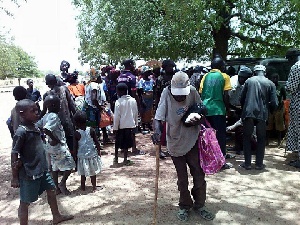A great number of them thronged the venues for the sharing either assisted by their grandchildren because they had lost their sight A hunger crisis, described as harsher than ever seen in recent years, has hit the Nabdam District of the Upper East region.
The crisis has left the worst-hit vulnerable groups, including children and disabled elderly people, searching for wild fruits to stay alive amid distress calls on both government and individuals for aid.
Crisis fuelled by short dams Nabdam and dam rhyme very closely on paper. But on the ground, many Nabdams and dams disappointingly are miles apart. The rural district, comprising 86 farming communities who grow mainly cereal crops, has only five dams to about 75,000 people.
The dams, sparsely situated at Zanlerigu, Sakote, Nangodi, Dasobligo and Kugri, at present are starved of sufficient rainwater as the dry season nears its dreaded peak. A great number of farming households, who live far away from the shrinking dam water, have nowhere to turn as the dugouts on which their crops and livestock depend are completely empty, showing only sun-cracked floors.
Rains fall within four months and an extremely dry season takes over for eight months in the northern part of Ghana that includes Nabdam. Many people who survive on farming have not been able to do any dry season agriculture to keep their food stores busy.
Dry-throated cattle, panting for water, are hoofing it miles away from communities within the district to the Red Volta where armed gangs of rustlers, in what Starr News has gathered, are herding the animals on cargo trucks to the cities to offer them for sale.
“As soon as they go to the Red Volta, the cows are no more for us. Notorious thieves, armed, they say they are untouchables, are raiding the whole place. They put our cows on trucks and send them down south. As soon as the animals go down to Red Volta, they are no more for us. There is no water. The place is dry,” the Paramount Chief of Sakote and President of the Upper East Regional House of Chiefs, Naba Sigri Bewong, told Starr News.
Emergency could trigger exodus Mass movement of people, particularly of the youth, from the deprived district to the densely inhabited cities in Ghana’s south is nothing new. What could be new this year if interventions delay, according to observers, is a possible record number of hungry youth and women moving in the short term out of the area in desperate search of unskilled jobs potentially more awful and harmful than the hunger that triggered the migration.
“As for the poverty level, it’s very serious, being aggravated by poor harvests. Nabdams, we don’t have dams. They are just dugouts. All these are not irrigation facilities with canals. Rural-urban migration is very high, very high. People move to the south. It’s very, very high. Dry season farming is what can stop these youth from travelling for jobs that are not there,” Francis Wongnab, former Presiding Member of the Nabdam District Assembly, said.
Disabled aged scramble for garri On Monday, about 200 aged people queued in four of the 13 electoral areas that make up the district for a bowl of garri and an amount of sugar worth three Ghana cedis each.
A great number of them thronged the venues for the sharing either assisted by their grandchildren because they had lost their sight or were accompanied by walking sticks because they were too weak to go the distance alone.
The items were sourced by Paul Wooma, founder of Operation Blessing, a charitable movement, from his friends in emergency response to the crisis. Mr. Wooma, a climate change advocate and native of the area, saw his emergency aid mobilisation attract too little to cover beyond the number of those who received and the quantity of what they took home.
“You realised that I could only afford to bring them garri and sugar. The number of those who have benefited is far less than the number of those we cannot reach because that’s all the support I was able to mobilise from friends who made personal contributions. I wish I had been able to hire a bus to bring them together. But they came on their own because I didn’t get that support,” Mr. Wooma said.
He was accompanied by the Chief Executive Officer of the Boison Academy (a football institution), Kojo Boison Dagbila, who volunteered to drive the items to the communities on his own car. The communities are Zanlerigu, Benzure/Naboke, Nyogbare and Kotintabig.
Hunger kills 8 children
Whilst the situation is said to have kept some children out of the classroom, a number of children are reported to have died out of it so far.
“In our area, our people don’t have anything to sell to send their children to hospital when they are ill. I can say more than eight children have died because of hunger,” Francis Sampana told Starr News.
Lami Sumplaliga, a girl attending the Kotintabig Primary School, spoke of chronic hunger as a robber threatening to steal her future away.
“Yesterday, I was absent from school because my mother did not cook. It’s all due to the lack of money. We will appreciate any help from anybody so that I can become somebody in future. There is hunger in many places here,” she pleaded.
One of the elderly women, Lariba Dingbila, lamented: “The hunger period has just begun. The situation is going to be more intense from next month when sowing begins. The early millet will take some time to become fully grown for harvest. Until then, we will only continue to search for wild fruits in the forests to stay alive.”
Regional News of Wednesday, 30 March 2016
Source: starrfmonline.com
Kids, aged survive on wild fruits over hunger crisis
Entertainment












